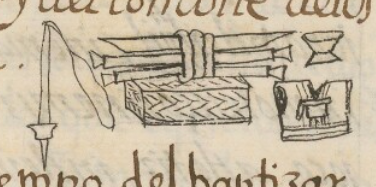petlacalli (FCbk6f170v)
This iconographic example, featuring a woven hamper or box (petlacalli), made from woven reeds, is included in this digital collection for the purpose of making potential comparisons with related hieroglyphs. The term selected for this example comes from the keywords chosen by the team behind the Digital Florentine Codex. There is no gloss. This example shows a horizontal, rectangular box that has a herringbone pattern that conveys that it is woven. This was one of five items that were given to a baby girl at the time of her baptism, according to the companion text.
Stephanie Wood
This petlacalli compares somewhat favorably with the hieroglyphs and other iconographic examples shown below. But this one does not obviously have a fitted top that comes down over the top of the lower box. Furthermore, three of the examples below apparently were made for keeping the precious feathers of the yellow-headed parrot (toztli). Interestingly, the compound word petlacalli derives from petlatl (a woven mat) and calli (a house or building). The use of calli in this way suggests a way of thinking of the term as a container or a place where things are kept inside. Finally, in two examples of thievery, the petlacalli was a container for keeping a person’s precious goods, such as bead necklaces.
Stephanie Wood
1577
Jeff Haskett-Wood
caja de caña, cajas, cestas, recipiente, recipientes, pluma, plumas, loro, loros
petlacal(li), a woven hamper, often with a lid, https://nahuatl.wired-humanities.org/content/petlacalli
una cesta rectangular (que muchas veces tiene una tapa)
Stephanie Wood
Available at Digital Florentine Codex/Códice Florentino Digital, edited by Kim N. Richter and Alicia Maria Houtrouw, "Book 6: Rhetoric and Moral Philosophy", fol. 170v, Getty Research Institute, 2023. https://florentinecodex.getty.edu/en/book/6/folio/170v/images/0. Accessed 7 July 2025.
Images of the digitized Florentine Codex are made available under the following Creative Commons license: CC BY-NC-ND (Attribution-NonCommercial-NoDerivs 4.0 International). For print-publication quality photos, please contact the Biblioteca Medicea Laurenziana ([email protected]). The Library of Congress has also published this manuscript, using the images of the World Digital Library copy. “The Library of Congress is unaware of any copyright or other restrictions in the World Digital Library Collection. Absent any such restrictions, these materials are free to use and reuse.”




